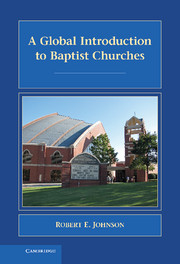Book contents
- Frontmatter
- Contents
- List of Illustrations
- Acknowledgments
- List of Important Baptist Organizations
- Global Baptist Timeline
- Introduction
- PART I FOUNDATIONS
- PART II AGE OF EMERGING BAPTIST DENOMINATIONAL TRADITIONS
- PART III THE FRONTIER AGE
- PART IV AGE OF PROLIFERATING TRADITIONING SOURCES
- PART V BELIEFS AND PRACTICES
- Index
PART IV - AGE OF PROLIFERATING TRADITIONING SOURCES
Global Baptist Development Phase 3, 1890 to Present
Published online by Cambridge University Press: 05 September 2012
- Frontmatter
- Contents
- List of Illustrations
- Acknowledgments
- List of Important Baptist Organizations
- Global Baptist Timeline
- Introduction
- PART I FOUNDATIONS
- PART II AGE OF EMERGING BAPTIST DENOMINATIONAL TRADITIONS
- PART III THE FRONTIER AGE
- PART IV AGE OF PROLIFERATING TRADITIONING SOURCES
- PART V BELIEFS AND PRACTICES
- Index
Summary
The Baptist Church in Russia has proved her vitality. Not only has she survived the systematic and long-continued persecution of both Church and State, she has done more – has grown strong, and diffused herself throughout the vast Russian Empire: “from the glowing plains of Colchis to the bleak rocks of Finland” – from St. Petersburg, across the snow-covered deserts of Siberia, to Amur and Manchuria. If a man should travel from Odessa to Churbin – a month’s journey by rail – he would find even in the latter remote town a little body of Russia’s believers. As to the variety of the nations and tribes who up to the present time have embraced our Baptist faith in their land, they comprise: Russians (proper), Armenians, Tartars, Germans, Poles, Esthonians [sic], Livonians, Lithuanians, Letts, Finns, and Swedes.
Vasili G. Pavloff, Odessa, Ukraine The Rise, Growth, and Present Position of the Baptist Body in Russia, 1908A BAPTIST PROFILE
On July 30, 1960, the Congo was granted its independence from Belgium. As would occur in numerous similar situations, many Congolese Baptists began to dream of a new day – one in which they would have greater choices over their own destinies. Ministerial ordination was symbolic of the problems that long had irritated these African Baptists. As did most other mission groups in Africa at the time, missionaries of the Conservative Baptist Foreign Mission Society (CBFMS) refused to ordain African pastors. Many believed that ordination required a level of education not available to Africans and, therefore, was a status that only missionaries could attain. Properly trained pastors (wapastor wachungaji) could administer the sacraments, but missionaries believed that ordained status would cause those leaders to become conceited and refused to extend to them that level of recognition. With no expectation of an end to the control of African Baptist churches by foreign Baptist leadership, some Congolese Baptists broke with the missionaries and formed a committee that they hoped could gain legal recognition for Congolese rights to ownership and administration of Baptist properties. Previous attempts under colonial governors always had been decided in favor of the missionaries. Many Congolese Baptists hoped that a change of government would offer a new opportunity.
- Type
- Chapter
- Information
- A Global Introduction to Baptist Churches , pp. 231 - 233Publisher: Cambridge University PressPrint publication year: 2010

